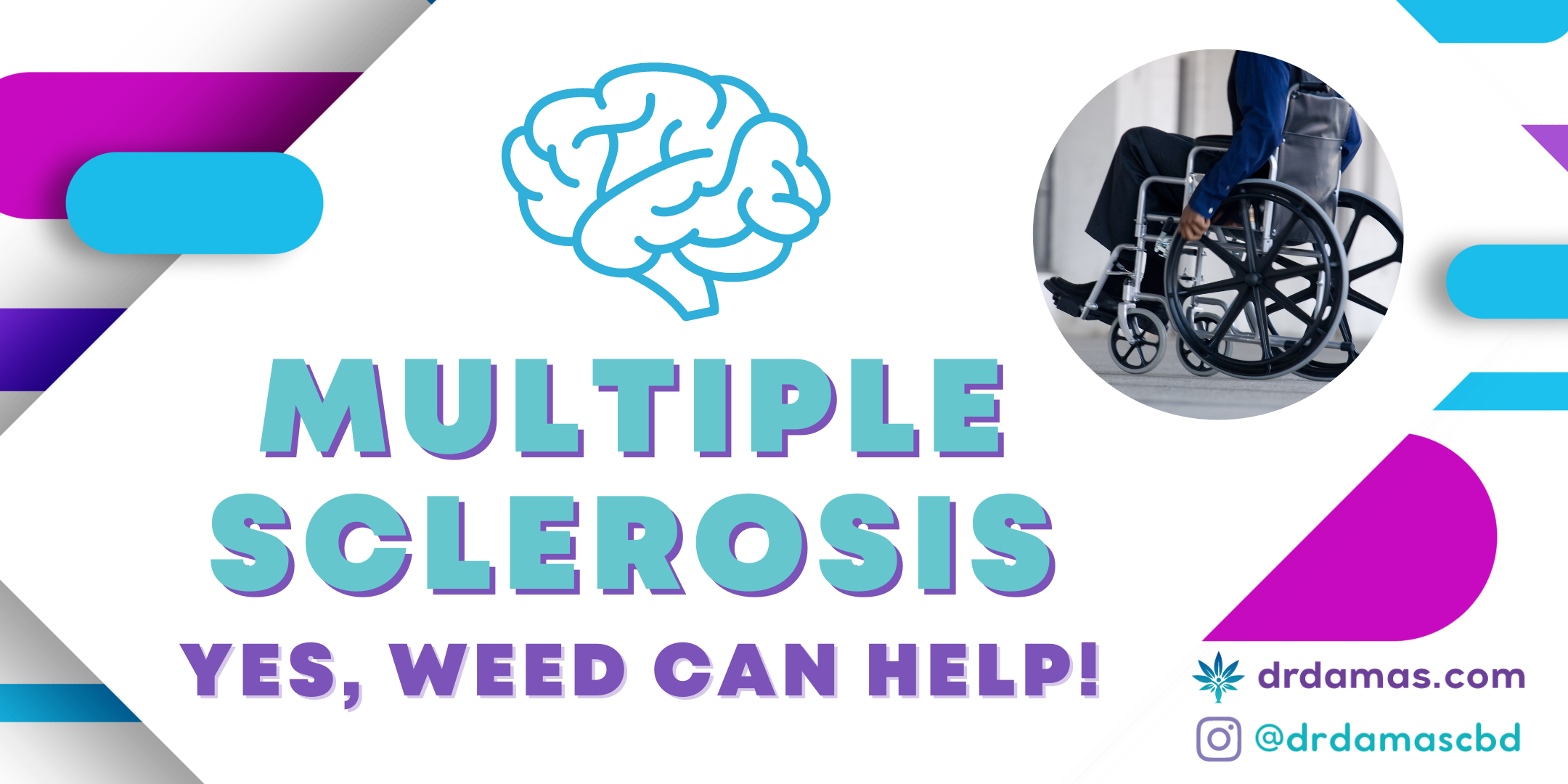Multiple Sclerosis: Yes, Weed can Help!
March is Multiple Sclerosis Awareness Month so it’s a great opportunity to discuss it. Multiple Sclerosis (MS) is a chronic, unpredictable disease of the central nervous system (CNS). It is characterized by demyelination, the breakdown of the protective sheath (myelin) that insulates nerve fibers. This disrupts communication between the brain and body, leading to a variety of symptoms including fatigue, muscle weakness, vision problems, and cognitive difficulties. In the state of Florida, as with many other states that have legalized medical marijuana- it is one of the qualifying conditions. Curiously I don't have a large number of MS patients. And amongst those patients, they tend to prefer a combination of CBD + THC products with higher ratios of CBD (more on that later).
Who Gets MS? …..That’s Interesting ….
Although MS can occur at any point in life, it's most commonly diagnosed between the ages of 20 and 40 . A study published in Neurology found that the average age of MS diagnosis in the US is 30.2 years old. Women are diagnosed slightly more often than men, with a ratio of about 3:2. However, ethnicity plays a significant role. Caucasian people have a significantly higher chance of developing MS compared to African Americans or Asians. A large-scale study published in The Lancet Neurology reported that Caucasians have a risk of MS that is nearly four times higher than African Americans. There is also some evidence that socioeconomic status may be a factor, with higher rates observed in individuals with higher incomes (wait, is this a rich person's disease? 🤔). Researchers believe this may be due to genetic, environmental factors and/ or lifestyle choices more prevalent in higher socioeconomic groups. Decreased vitamin D because of low sunlight exposure being an example (rich people ain't out in the sun working 😅).
Pearls
The average age of MS diagnosis in the US is 30.2 years old, but MS can develop at any age.
Caucasians are more susceptible to MS than other ethnicities.
Traditional Treatments for MS: Cooked up in the Lab
There is currently no cure for MS, but there are a variety of medications available to manage symptoms and slow disease progression. Feel free to skip this next section if you’re not really interested in how big pharma chooses to treat the condition (you can go straight to the pearls- it's ok with me 🙂)
Disease-modifying therapies (DMTs): These are the cornerstone of MS treatment. DMTs work by suppressing the immune system's attack on myelin. Here are some examples of DMTs, categorized by their mechanism of action:
Interferon-beta drugs (e.g., Avonex, Rebif): These medications interfere with the communication between immune system cells, reducing inflammation.
Glatiramer acetate (Copaxone): This medication works by mimicking a specific myelin protein, confusing the immune system and preventing it from attacking myelin.
Fumarate medications (Tecfidera, Diroximel fumarate): These medications have a less well-understood mechanism of action, but they are thought to suppress the immune system and may have some neuroprotective effects.
Sphingosine 1-phosphate (S1P) receptor modulators (Gilenya, fingolimod): These medications prevent immune cells from leaving the lymph nodes, reducing their ability to attack the central nervous system.
Natalizumab (Tysabri): This medication specifically targets a protein on immune cells that allows them to cross the blood-brain barrier, preventing them from reaching the central nervous system.
Ocrelizumab (Ocrevus): This medication depletes a specific type of immune cell (B cells) that is thought to play a role in MS.
Alemtuzumab (Lemtrada): This is a powerful medication that significantly depletes immune cells. It is typically reserved for relapsing-remitting MS that has not responded to other treatments due to its higher risk of side effects.
While DMTs are effective in slowing disease progression and reducing relapses, they can have side effects like fatigue, flu-like symptoms, injection site reactions, and an increased risk of infection. It's important to work closely with your doctor to find the right DMT for you, considering your individual risk factors and treatment goals.
Pearls
DMTs are the first line of defense in managing MS, but come with potential side effects.
There are several different types of DMTs with varying mechanisms of action and side effect profiles.
Holistic and Integrative Approaches to MS Management
If you’re not really into the western medicine options and want to consider some other choices, a lot of people find relief by incorporating holistic and integrative therapies into their management plan. Here are some examples:
Physical therapy: A 2023 study published in Multiple Sclerosis Journal found that physical therapy programs can significantly improve walking ability, muscle strength, and balance in people with MS.
Occupational therapy: A 2022 review published in Disability and Rehabilitation found that occupational therapy can help individuals with MS adapt to their changing abilities and maintain independence in daily living activities [9].
Mind-body therapies: A 2017 review published in Complementary Therapies in Medicine found that yoga and meditation may be helpful in reducing stress, anxiety, and fatigue in people with MS].
Tai Chi: A 2019 study published in Complementary Therapies in Medicine found that Tai Chi practice can improve balance, walking ability, and reduce fatigue in people with MS.
Cognitive Behavioral Therapy (CBT): A 2015 Cochrane Review concluded that CBT can be effective in reducing depression and anxiety in people with MS.
Complementary Dietary Practices:
While there is no single MS diet, some dietary practices may offer benefits in managing symptoms and promoting overall health:
Linoleic Acid: A 2018 review published in Frontiers in Neurology suggested that a diet rich in linoleic acid, an omega-6 fatty acid found in vegetable oils and nuts, may be helpful in reducing inflammation and improving nerve function in MS.
Vitamin D: There is some evidence that vitamin D deficiency may be more common in people with MS. Ensuring adequate vitamin D levels through diet or supplementation may be beneficial, but consult your doctor before starting any supplements.
Remember: *It's important to discuss any dietary changes or complementary therapies with your doctor to ensure they are safe and don't interfere with your current medications.*
Pearls
Mind-body therapies like yoga, meditation, and Tai Chi can improve balance, reduce fatigue, and manage stress in people with MS.
A balanced diet rich in linoleic acid and ensuring adequate vitamin D levels may be beneficial for some individuals with MS.
Exploring Cannabis and CBD for MS
The use of cannabis and cannabinoids like cannabidiol (CBD) for managing MS symptoms is growing rapidly. As I mentioned earlier, it is one of the qualifying conditions for medical marijuan in a number of states. Studies suggest that cannabis may be helpful in reducing pain, spasticity, and improving sleep in some individuals. My patients tend to use higher content CBD products as it allows them to function all day without their medicine “going to their head” as some have told me 🙂
I always like to discuss the different ways you can use your plant medicine. There’s no right way- each has its own advantages and disadvantages. Here’s a refresher:
Inhalation: This method offers the fastest onset of effects but may irritate the lungs and is not suitable for everyone, especially those with respiratory issues.
Oral consumption: Edibles and capsules offer a sustained release of cannabinoids but take longer to take effect (up to 2 hours) and can be unpredictable in terms of dosing.
Topicals: Creams and lotions can be applied directly to areas of pain or inflammation for localized relief but may not be effective for managing widespread symptoms.
Things to Remember:
Legality: Cannabis laws vary widely by state and country. It's crucial to consult with a healthcare professional knowledgeable about medical cannabis and the legalities in your area.
Drug Interactions: Cannabis can interact with some medications, so it's important to disclose all medications you are taking to your doctor before considering cannabis use.
Side Effects: While generally well-tolerated, cannabis can cause side effects like dry mouth, dizziness, and drowsiness.
The Need for More Research:
While some studies suggest benefits of cannabis for MS, more high-quality research is needed to determine the long-term safety and efficacy of various cannabis strains, products, and dosing regimens for managing specific MS symptoms. There is no magic cure in CBD or cannabis, just ways to potentially help manage your symptoms.
Pearls
Some studies suggest cannabis may help manage pain, spasticity, and sleep problems in MS, but more research is needed.
There are various routes of administration for cannabis and CBD, each with its own pros and cons.
Wrapping it all Up: Living Well with MS
MS is a complex disease, and the path to managing it effectively looks different for everyone. Here at Dr. Damas's office, we understand the unique challenges faced by people with MS. We offer a comprehensive approach to care, combining traditional medical treatments with evidence-based holistic and integrative therapies to help you find the best solution for your personal needs. With the right approach you may find better ways to manage your MS. If you are considering using cannabis or CBD for MS, talk to your doctor about the potential benefits and risks and whether it's right for you.
PS, since you’ve made it this far, I’ll take it that you must be really interested 😎
So, if you wanna stay on top of things, here are a few reputable sources you can go to:
National MS Society: https://www.nationalmssociety.org/
Multiple Sclerosis Foundation: https://msfocus.org/
The Myelin Repair Foundation: https://myelinrepair.org/
References:
[1] National Institutes of Health: Multiple Sclerosis https://www.ninds.nih.gov/health-information/disorders/multiple-sclerosis?search-term=multiple%20sclerosis#toc-what-is-multiple-sclerosis-
[2] Neurology: Average Onset Age of Clinically Isolated Syndrome and Multiple Sclerosis in a US Population https://pubmed.ncbi.nlm.nih.gov/29157401/
[3] The Lancet Neurology: Global, regional, and national prevalence of multiple sclerosis in 2013: a descriptive neurological analysis for the Global Burden of Disease Study 2013 https://pubmed.ncbi.nlm.nih.gov/30679040/
[4] Multiple Sclerosis Journal: Effects of a home-based progressive resistance exercise program on physical function in people with multiple sclerosis: A randomized controlled trial https://www.ncbi.nlm.nih.gov/pmc/articles/PMC10660496/
[5] Disability and Rehabilitation: A systematic review of the impact of occupational therapy on participation for people with multiple sclerosis https://research.aota.org/ajot/article/75/4/7504190020/12526/Evidence-for-Occupational-Therapy-Interventions
[6] Complementary Therapies in Medicine: The effect of yoga on fatigue, anxiety, and depression in multiple sclerosis: A systematic review and meta-analysis of randomized controlled trials https://www.sciencedirect.com/science/article/abs/pii/S1744388119308564
[7] Complementary Therapies in Medicine: The effects of Tai Chi Chuan on balance, walking, and fatigue in people with multiple sclerosis: A systematic review and meta-analysis https://www.sciencedirect.com/science/article/pii/S1550830723001714
[8] Cochrane Database of Systematic Reviews: Cognitive Behavioural Therapy for Depression in Multiple Sclerosis https://www.cochrane.org/CD007295/MS_drug-treatment-for-depression-in-multiple-sclerosis
[9] Frontiers in Neurology: Role of Omega-6 and Omega-3 Fatty Acids in Demyelinating Diseases https://www.ncbi.nlm.nih.gov/pmc/articles/PMC7059745/



